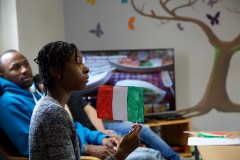 This month we are exploring issues of loneliness and disability as part of our Spotlight on Loneliness month. A survey conducted by Sense in 2015 found that one in four disabled people feel lonely on a typical day – for young disabled people aged 18-34 this rose to well over one in three. This month we will discover some of the reasons for this trend, and explore ways that the loneliness of disabled people can be alleviated.
This month we are exploring issues of loneliness and disability as part of our Spotlight on Loneliness month. A survey conducted by Sense in 2015 found that one in four disabled people feel lonely on a typical day – for young disabled people aged 18-34 this rose to well over one in three. This month we will discover some of the reasons for this trend, and explore ways that the loneliness of disabled people can be alleviated.
Inaccessibility
We recently met Megan, a wheelchair user who finds it difficult to get out and about on her own. Megan told us of the challenges she faces using public transport to get about, and how difficult it can be navigating busy public spaces where she would like to be able to meet her friends. And Megan is not alone – the World Health Organisation estimates that one in six people struggle in environments that are not accessible for disabled people.
Misunderstanding
 Physically accessing spaces isn’t the only problem. Sense’s study found that the majority of British people admit to feeling uncomfortable when talking to a disabled person, and a fifth of 18-34 year olds have avoided talking to a disabled person because they don’t know how to communicate with them. Unfortunately, some disabled people have also said that they have lost friendships as their disability has got worse or they have developed other health problems. In these instances, friends or family may have struggled to know how to be supportive in changing circumstances and instead have drawn away.
Physically accessing spaces isn’t the only problem. Sense’s study found that the majority of British people admit to feeling uncomfortable when talking to a disabled person, and a fifth of 18-34 year olds have avoided talking to a disabled person because they don’t know how to communicate with them. Unfortunately, some disabled people have also said that they have lost friendships as their disability has got worse or they have developed other health problems. In these instances, friends or family may have struggled to know how to be supportive in changing circumstances and instead have drawn away.
Poverty
Many people who live with disabilities have restricted incomes. Even those who are in work or who receive benefits may spend a lot of their income on costly human support or equipment to complete daily tasks, leaving very little money for socialising with friends.
Social isolation
These factors combined can leave many people feeling isolated and lonely. At WaveLength we work with disabled individuals and other charities that support disabled people, working to help them overcome their loneliness. Throughout this month we will hear from some of these people and organisations about how loneliness has affected their lives and how they are working to overcome it.

